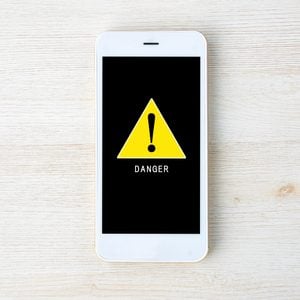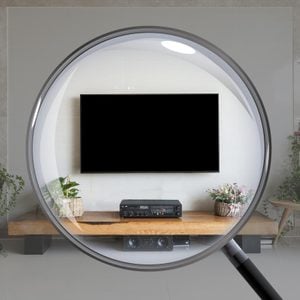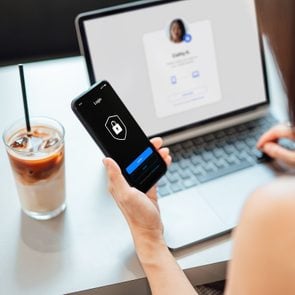How to Tell If Someone Is Spying on Your iPhone
Updated: Feb. 01, 2024
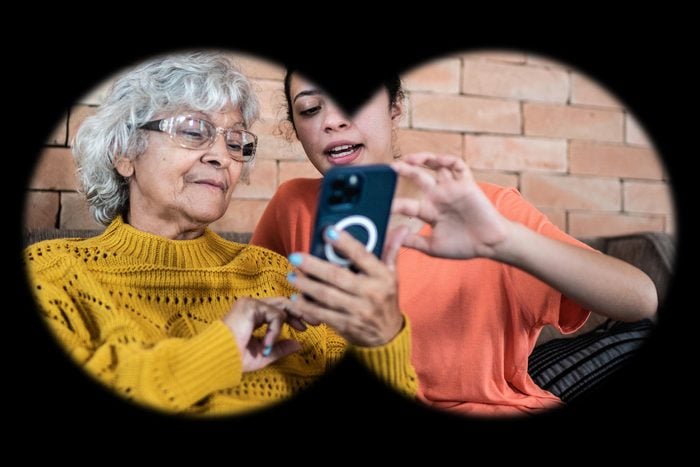
It's scary to think that someone might be spying on your iPhone, but you can take steps to prevent and detect this security threat
For many people, mobile phones are among their most personal possessions. The amount of private information they contain about you and your loved ones can be valuable for hackers or those who wish to stalk you electronically. For this reason, it’s critical to know how to tell if someone is spying on your iPhone. It happens more often than you might think.
“Imagine a vengeful ex or a disgruntled business partner keeping tabs on your conversations,” suggests Chris Olson, CEO of the Media Trust. It’s easy enough to do by installing stalkerware—a type of spyware—directly on a user’s device. “It can also be installed remotely by malicious cyber actors for doxxing or financial fraud,” he says. “Worst of all, it may be embedded in seemingly legitimate applications and installed by the user unintentionally.”
It’s definitely worth spending the time to learn which phone apps may be spying on you and how to remove spyware from an iPhone. While you’re at it, learn to determine if your computer has been hacked too, and brush up on online security, mobile security threats and data brokers.
What is stalkerware?
Stalkerware is a type of “sophisticated malware” that can gain access to and full control of a smartphone, according to Ameer Al-Nemrat, PhD, a reader in information security and computer forensics at the University of East London. “Stalkerware accesses the root of a smartphone, which means that it can view SMS messages, photos and videos, and listen to calls,” he explains. “[It also can view] end-to-end encrypted messages in apps such as WhatsApp, Signal and Telegram.”
Al-Nemrat points out that unlike spyware, which is mainly used by criminals hoping to steal credentials or crypto wallet keys from a device and authoritarian regimes monitoring chats, stalkerware almost always targets a particular individual. In fact, stalkerware is most commonly used for tracking spouses.
When someone is targeted by stalkerware, “the culprit usually has physical access to the other person’s device,” Al-Nemrat says. Knowing what stalkerware is and how to tell if someone is spying on your iPhone can save you a lot of headaches.
What does stalkerware do on your iPhone?
Stalkerware (and spyware) can monitor your device for data such as your location, which URLs you’ve visited and which apps you’ve recently run. It can even log keystrokes, giving away information about anything you’ve typed into your phone, including passwords. Because it’s easily available to the general public, stalkerware can compromise your privacy, says Andrew Whaley, senior technical director at Promon. Even worse, if installed by an abuser—say, to track their victim’s every step—it can have a serious outcome, such as physical harm.
There are some legitimate uses of stalkerware and spyware, however. ”Employers are probably within their rights to install monitoring software on company-owned property for the purposes of asset management and compliance, such as monitoring emails and other communications,” Whaley says.
Parents, too, may want to install it on their children’s devices. “Parents and children may feel safer if a child’s location is monitored,” he adds. “However, in both of these cases, it is important that monitoring software be discussed and understood by both parties. What most people would consider unacceptable is when hidden or overly intrusive monitoring is taking place.”
How does stalkerware get on your phone?
Tom Gaffney, security expert at F-Secure, says stalkerware can be sent to a phone via email, text or WhatsApp, and then needs to be installed, requiring physical access to your phone. Whether installed by employers, parents or suspicious spouses or exes, installation takes less than a minute.
Gaffney says stalkerware grew substantially during the pandemic, though it has mainly affected Android devices. “F-Secure labs saw a fivefold increase in attempted installations of stalkerware between January and July of 2021. The largest one in action is called Trackview.”
How can you tell if someone is spying on your iPhone?
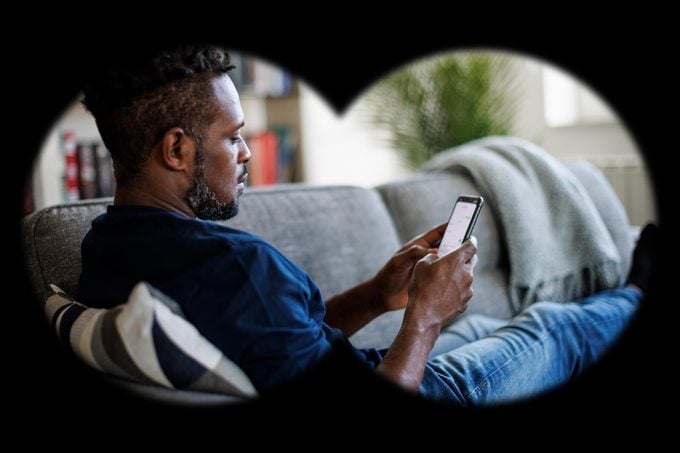
Al-Nemrat says it can be quite difficult for someone who’s not tech-savvy to identify spyware on their phone. He suggests going into your iPhone settings to General > VPN & Device Management to see if your device is being managed by someone else. If it is, then you’ll want to enable or disable the VPN connection or permission in the phone settings. You can do that via the info button next to the list of VPN connections.
1. Your phone gets really hot
If you find that your phone has been getting unusually hot lately, it may be a sign that it has been hacked. Spyware running in the background can make your phone work harder and subsequently put out more heat.
2. Your battery drains quickly
Look for sudden changes in the amount of time it takes for your phone’s battery to run out. A tracked phone will be continually sending data from the phone to the hacker, which makes your phone use more power and will deplete the battery much more quickly than normal.
3. Your monthly data usage is inexplicably higher
A tapped phone uses a lot of data because it is continuously sending information back to the hacker’s phone or computer.
4. Your phone reboots unexpectedly
The malware on your phone may be interfering with its normal functioning, essentially making it glitch out and restart randomly.
5. Your phone takes a long time to shut down
When you turn off your phone, it needs to close all the apps running in the background. If it takes longer than usual, it might be a sign that stalkerware has been installed on your phone.
6. Your phone has been jailbroken
Jailbreaking is the process of removing manufacturer restrictions in order to gain access to areas of the phone that would normally be protected. It is a practice commonly used by hackers to install spyware. If you suddenly see a new app called Cydia on your phone, it’s a sign that your phone may have been jailbroken.
7. You’re hearing background noise or electronic interference
Newer tracking software is completely quiet, but older versions may produce echoes, static or clicking sounds if someone is listening in on your calls.
8. Your cell phone is slower than normal
Every phone gets slower over time, but if you encounter this along with other problems on this list, be suspicious.
9. Spyware detection apps alert you to unusual activity
If you suspect you’re being stalked, consider downloading and installing a spyware detection app such as Avast, AVG, Certo AntiSpy or McAfee. These look for well-known installed packages and alert you when they find something. Be aware, however, that stalkerware changes so often that experts question their effectiveness.
What should you do if your phone is being tracked?
If you’ve agreed to let an employer or family member install stalkerware, then you don’t need to take further action. Spyware will be installed illegally, however, via a remote exploit—a type of software bug, Whaley explains, that takes advantage of your device over a network connection—or embedded in an app that you’ve installed.
“If you suspect you are being monitored, the first step would be to remove any recently installed apps,” Whaley advises. “Following this, rebooting the device will clear any transient infection. However, the only sure way to remove any suspected spyware would be to factory reset your device and start again,” Whaley adds. “Ideally, politically exposed individuals should do this daily or weekly.”
You should also turn off location sharing in your iPhone privacy settings. However, Whaley cautions that while this will help protect against stalkerware, it might not prevent other forms of spyware from tracking you.
It’s important, too, to always update your iPhone’s operating system, as it closes off known exploits.
According to Whaley, “iOS has just introduced something called ‘lockdown mode,’ which puts the phone in a limited functionality mode to try and prevent some of the activities of spyware. It remains to be seen how effective that will be.”
“However, it is extremely important to remember that if your phone has stalkerware, your activities will be seen by other people,” Al-Nemrat warns. For that reason, be sure to use another device—one that’s not on your network—to take action, whether that’s Googling the next steps or calling a professional to remove the stalkerware.
How can you protect yourself from phone spyware?
The best way to avoid being a victim of spyware is to keep an eye on your phone at all times to prevent someone you don’t trust from getting ahold of it. Olson suggests protecting your phone with a passcode, passphrase, Face ID or Touch ID. If you use a passphrase, Olson recommends using long alphanumeric phrases, as they’re the most secure form of authentication on iOS.
“Be careful which apps you download from the app store,” he warns, as many provide access to your data to third parties, who may be tracking your activities without your knowledge. Finally, he suggests asking developers to scan their applications for vulnerable code to protect you better.
Al-Nemrat recommends changing your device passcodes every so often and adding two-factor authentication (2FA) to your device as an additional login credential outside of a username/password.
“There are plenty of antivirus software [programs that] can be used to detect and protect against stalkerware, although none of them are 100% guaranteed,” Al-Nemrat says.
Now that you’ve learned how to tell if someone is spying on your iPhone, check out the signs someone stole your identity.
Additional reporting by Alina Bradford.
Sources:
- Chris Olson, CEO of The Media Trust
- Ameer Al-Nemrat, PhD, reader in information security and computer forensics at the University of East London
- Andrew Whaley, senior technical director of Promon
- Tom Gaffney, security expert at F-Secure

